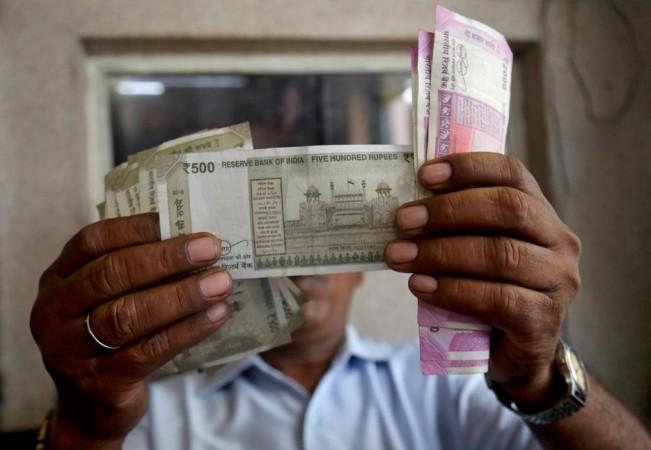Even though India's economic recovery accelerated in Q2FY21 from the lows of the pandemic-induced lockdown, the country, for the very first time since Independence, entered into a technical recession. The National Statistical Office (NSO) data on Friday showed that the Q2FY21 GDP, on a year-on-year basis, contracted by (-) 7.5 per cent from (-) 23.9 per cent in the preceding quarter.
Though not comparable, the GDP had grown by 4.4 per cent in the corresponding quarter of FY2019-20. In financial parlance, an economy is said to have entered a technical recession after it consistently remains in the negative output territory for two subsequent quarters.

This trend underscores the reduction in purchasing power along with lower tax collection for the government, likely defaults on debt and falling Capex spends. According to the NSO, the GDP at 'Constant (2011-12) Prices' in Q2FY21 is estimated at Rs 33.14 lakh crore as against Rs 35.84 lakh crore in Q2FY20, showing a contraction of 7.5 per cent as compared to 4.4 per cent growth in Q2FY21.
The country had observed mobility restrictions as mandated under the lockdown measures for the better part of the first quarter of FY21. It was only on June 1 that partial unlock measures were implemented.
However, a contraction at this scale is unprecedented and never been witnessed since the current practice of quarterly series data dissemination began in the late 1990s. In terms of the quarterly Gross Value Added, the NSO data showed a year-on-year contraction of seven per cent from (-) 22.8 per cent in Q1FY21.
"Quarterly 'GVA at Basic Prices at Constant (2011-12) Prices' for Q2 of 2020-21 is estimated at Rs 30.49 lakh crore, as against Rs 32.78 lakh crore in Q2 of 2019-20, showing a contraction of 7 per cent," the NSO said in the estimates of Q2FY21 GDP.
"With a view to contain the spread of the Covid-19 pandemic, restrictions were imposed on the economic activities not deemed essential during Q1. Though the restrictions have been gradually lifted, there has been an impact on the economic activities," it added.
The GVA includes taxes, but excludes subsidies
On a YoY basis, Q2 GVA for 2020-21 from the agriculture, forestry and fishing sector inched lower to 3.4 per cent growth, against 3.5 per cent in the same quarter of 2019-20. The GVA in Q2 2020-21 from the manufacturing sector grew 0.6 per cent, as compared to a de-growth of (-) 0.6 per cent in the corresponding quarter of the previous fiscal.
Similarly, the mining and quarrying sector declined by (-) 9.1 per cent against previous year's fall rate of (-) 1.1 per cent. However, the electricity, gas, water supply & other utility services sector showed a growth of 4.4 per cent from a rise of 3.9 per cent in Q2FY20.
"With a view to contain the spread of the Covid-19 pandemic, restrictions were imposed on the economic activities not deemed essential during Q1. Though the restrictions have been gradually lifted, there has been an impact on the economic activities," the NSO said.
"In these circumstances, some other data sources such as GST, interactions with professional bodies etc. were also referred to for corroborative evidence and these were clearly limited."
Aditi Nayar, Principal Economist, ICRA, said: "Notwithstanding the unsavoury confirmation that India is in a recession, the GDP data provided a positive surprise. Discouragingly, the pace of contraction of two sub-sectors, financial, real estate and professional services, and public administration, defence and other services, actually worsened in Q2 FY2021 relative to the previous quarter, serving as a reminder that the path out of the pandemic may not be smooth."
"Nevertheless, the extent of the recovery in the performance of the informal sectors in Q2 FY2021 remains unclear, and we caution that trends in the same may not get fully reflected in the GDP data, given the lack of adequate proxies to evaluate the less formal sectors."
Sunil Kumar Sinha, Principal Economist, India Ratings and Research said:"From the supply side while most of the sectors have done as expected and continue to be in contractionary mode, the surprise of the pack is manufacturing sector which showed a growth of 0.6 per cent in2QFY21 GDP."

"Some of the high frequency indicators such as auto sales had been indicating the pick up for a while. As the expectation was that a combination of the pent-up and festive demand will play a big role in pushing the demand, manufacturing sector geared up itself by building up the inventory through the months of August and September. The other sector that has done well is electricity, gas, water supply & other utility service."
"From the demand side, while the consumption and investment demand shows sequential improvement, as expected, they are still in a contractionary mode on YoY basis. Surprisingly government consumption expenditure has recorded a contraction of 22 per cent in 2QFY21 as against a growth of 16.4 per cent in 1QFY21."
Acuite Ratings & Research Chief Analytical Officer Suman Chowdhury pointed out: "The agriculture sector continues its good run with 3.4 per cent growth and the manufacturing sector has also slightly surprised with a growth of 0.6 per cent.
"Further, the electricity sector has shown a healthy trajectory with 4.4 per cent growth mainly due to a pickup in household demand and nationwide electrification. However, the services sector continued to witness significant challenges at (-) 11.4 per cent YoY particularly in financial services and in segments such as retail, hospitality and tourism."

















